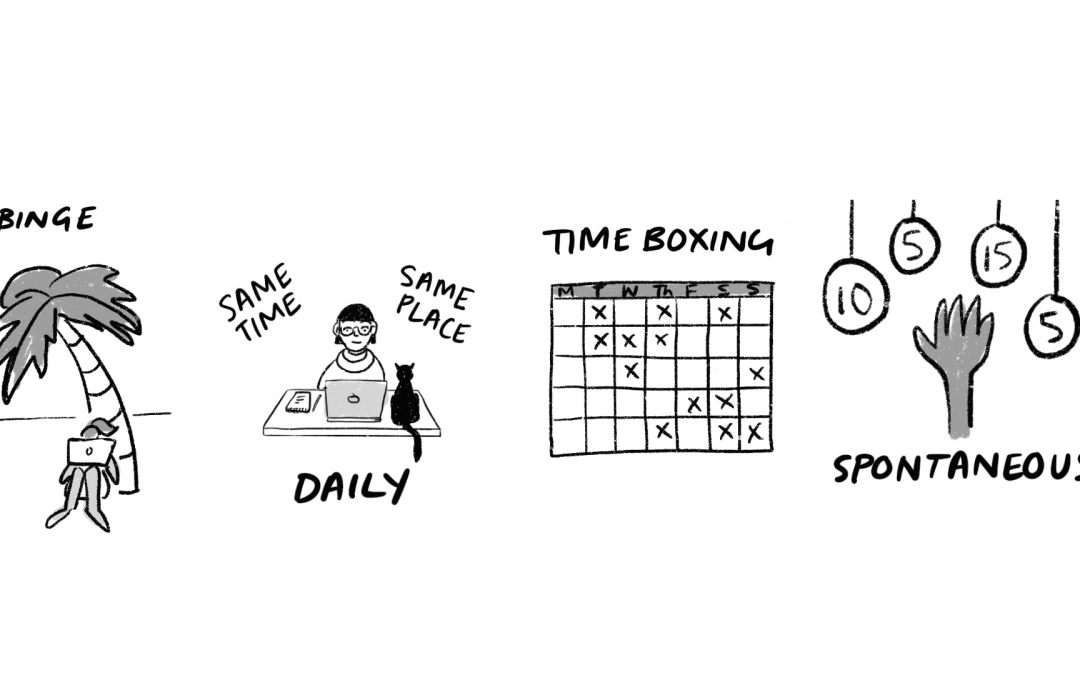Spontaneous writers grab any opportunity to write. With busy or unpredictable schedules, they need to be prepared to write at the drop of a hat. Find out how to become a master of spontaneous writing and keep alert to the pitfalls of this approach to writing time.
The 4 approaches for making time to write
We’ve asked over 3,500 writers how they fit writing into their life. We found four approaches, including having a daily writing routine, time boxing across a week or two, and binge which is often know as binge writing. The fourth approach is spontaneous writing which involves grabbing any and every opportunity to write.
This post explores how to make the most of spontaneous writing.
Remember, how you write will change over your current writing project, between different types and genres of writing and across your writing life. Keep experimenting with the other approaches to make the most of the time you have.
>> Read more: How to make time to write – 4 approaches to finding time in busy schedules
The spontaneous writer grabs any opportunity to write
The spontaneous writer makes the most of delayed trains, cancelled meetings and sleeping children to write. They are instinctive and can write anytime, anyplace, anywhere – whenever the opportunity arises. They don’t get distracted and can find their focus fast.
“An instinctive writer who can write anytime, anyplace, anywhere.”
Benefits of spontaneous writing
Spontaneous writers have accepted that their schedule is full or unpredictable and have found an approach that enables them to write despite everything going on. They are flexible opportunists who have writing as a to hand task whenever their schedule changes.
Rather than them being impulsive or inspiration-driven, successful spontaneous writers are incredibly prepared. They must be ready so they can make the most of fleeting opportunities when they arise. They know what to write and have a notebook, envelope or smartphone notes app on call at all times.
Researchers have coined the phrase ‘togglers’ for academic writers who write in bursts of less than 15 minutes – often rushing between meetings and lectures.
A master of spontaneous writing doesn’t procrastinate – there’s no time to waste – it’s write and go. This ‘snacking’ approach can over a day or a week add up to considerable progress.
>> Read more: Time confetti – snatching time to write when you have none
Downsides of a spontaneous approach
Spontaneity is fun. There’s a wonderful buzz from getting the words on the page. However, it isn’t all about splurging. Some spontaneous writers struggle with organisation, planning and editing. They forget to step back and consider the bigger picture.
They might end up flitting between quick-win ideas or even quit when it gets hard and persistence is needed to finish something.
If life gets busy, opportunities become ever rarer forcing some writers to stop writing completely.
How to develop a spontaneous writing practice
Daily writers and time boxers have it easy with their willpower-beating routines and allocated writing slots – spontaneity is a more difficult route.
To master spontaneity you must decide if you want to write, commit to making progress, then harness your determination to make this work by overcoming distraction, delay and procrastination.
While your calendar might be filled dawn to dusk each day, the good news is that there’s fifteen minutes of slack in your schedule each day. The time might vary from day to day, but it’s there – you just need to spot it when it crops up.
Be spontaneous by planning ahead
The first step is to work out your writing goal.
>> Read more: How to set a writing goal: the ultimate guide
You’ll have an overall project you’re working on, and this will break down into smaller steps. For example, if you’re working on a novel you could aim to complete milestones such as paragraphs, pages or chapters, or focus on word counts, an amount of time spent writing or a target number of sessions.
You can set yourself a challenge to find the time to meet your goal.
- Set a quota – work out the total time or amount you need to write each day or week.
- Commit to it – write it down and focus on achieving it day by day.
- Review your schedule daily – work out what can’t be moved and identify a couple of opportunities.
- Be spontaneous – if an opportunity to write presents itself you must not hesitate – grab it with both hands and use it.
- Be prepared – you might find yourself with five minutes in a toilet cubicle between meetings so make sure you have your note book or notes app with you at all times.
Finally, stretch yourself by scheduling
Make a note of what you did by tracking when and how it went, and after a week or two review it. You might find your schedule is less unpredictable than you thought and an opportunity presents itself at a similar time, or between certain activities – if so pay attention and you might be able to find a regular trigger for writing.
Though you might find it hard, schedule some longer periods to concentrate on your goal so you can go deep and make significant progress with planning, editing or good old writing.




